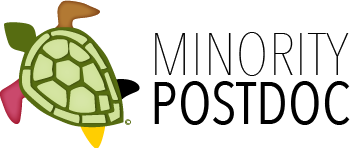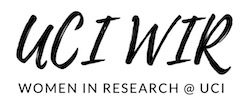 For many women in academia, the postdoctoral stage represents an exciting launchpad for their independent careers while simultaneously revealing systematic gaps in the career support for women. Dr. Alie Male arrived at the University of California, Irvine (UCI) in 2019, eager to start her postdoctoral training in neuroscience. Upon her arrival, she unsuccessfully scoured the university website for opportunities to connect with other postdoctoral fellows and faculty to form a community outside of her research group. She realized that the university lacked robust infrastructure supporting postdoctoral mentorship especially for female peer support.
For many women in academia, the postdoctoral stage represents an exciting launchpad for their independent careers while simultaneously revealing systematic gaps in the career support for women. Dr. Alie Male arrived at the University of California, Irvine (UCI) in 2019, eager to start her postdoctoral training in neuroscience. Upon her arrival, she unsuccessfully scoured the university website for opportunities to connect with other postdoctoral fellows and faculty to form a community outside of her research group. She realized that the university lacked robust infrastructure supporting postdoctoral mentorship especially for female peer support.
Institutional Gaps and the "Leaky Pipeline"
Unfortunately, her experience is not unique. Postdoctoral appointments are becoming an expected step in the academic career path, yet universities are lagging in integrating postdoctoral fellows into their campus communities. A gap in institutional support at this critical career juncture may be one explanation for the underrepresentation of female faculty in senior academic positions.
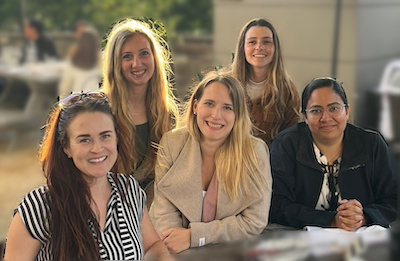 Despite women earning the majority of doctoral degrees in the life and health sciences and forty-seven percent of doctoral degrees overall [National Center for Science and Engineering Statistics 2023], women hold only thirty-three percent of tenured academic faculty positions in the Science, Technology, Engineering, and Mathematics (STEM) fields as of 2019 [National Science Board 2021]. This disparity is even more pronounced in specific subfields such as engineering and computer science, and in higher levels of academia such as full professor appointments and departmental or institutional leadership positions [McCullough 2019]. The greater attrition of women from academia compared to their male peers has been referred to as the "leaky pipeline" [Pell 1996]. These statistics suggest that, at the critical juncture between postdoctoral fellowship to tenure-track faculty positions, this leak is a torrent.
Despite women earning the majority of doctoral degrees in the life and health sciences and forty-seven percent of doctoral degrees overall [National Center for Science and Engineering Statistics 2023], women hold only thirty-three percent of tenured academic faculty positions in the Science, Technology, Engineering, and Mathematics (STEM) fields as of 2019 [National Science Board 2021]. This disparity is even more pronounced in specific subfields such as engineering and computer science, and in higher levels of academia such as full professor appointments and departmental or institutional leadership positions [McCullough 2019]. The greater attrition of women from academia compared to their male peers has been referred to as the "leaky pipeline" [Pell 1996]. These statistics suggest that, at the critical juncture between postdoctoral fellowship to tenure-track faculty positions, this leak is a torrent.
Barriers to Retention of Women in STEM
Women scientists face a myriad of challenges in academia that particularly emerge during the postdoctoral stage, which may contribute to attrition during this time. While the postdoc is an essential career phase to demonstrate research caliber and productivity, women face many challenges such as gender biases in hiring [Roper 2019], disparity in securing grant funding [Hechtman et al. 2018], and inequity in publishing and citations [Bransch & Kvasnicka, 2022; Ross et al., 2022; Teich et al., 2022; Lerchenmueller & Sorenson 2018], which leads to less perceived research achievements. In addition to research related challenges, service work is more often performed by women and is undervalued in career progression [Wu et al., 2023; Guarino & Bordin 2017]. Further, the postdoctoral phase has a complicated overlap with a time in women’s personal lives when some may choose to begin families or to have young children, which can be an additional source of stress or bias [Lee et al., 2017; Morgan et al. 2021]. Successfully navigating these challenges relies on strategies and advice that is not typically included in standard academic training, but can be gleaned from direct mentorship with female faculty who have experienced and overcome these barriers firsthand.
WIR fosters supportive spaces for postdoctoral women
Inception and Impact of UCI WIR
Dr. Male ultimately realized that she would need to create the infrastructure for postdoctoral support that she wanted herself, and thus launched the UCI Women in Research (WIR) mentorship program. WIR forges transdisciplinary connections between postdoctoral women and faculty, and fosters supportive spaces for postdoctoral women to speak candidly and receive support about the challenges to succeed as women in academia. In building this unique community, WIR is designed to empower postdoctoral women with the strategies to successfully traverse the cracks in the academic pipeline.
The core of the program centers on regular meetings across a one-year period between small cohorts of postdoctoral women and a female senior faculty. Each mentoring session centered around a theme for discussion, covering topics such as how to recruit students and build a research group, navigating gender bias in academia, establishing professional collaborations, succeeding on the academic job market, to the ever-elusive work-life balance. By fostering these new spaces for mentorship, WIR helps to instill a sense of belonging in postdoctoral women at UCI, which is a crucial intangible element that is known to influence women’s decision-making regarding career choices in STEM. In addition to the small group mentorship, WIR also holds targeted career development events open to all postdoctoral women, such as networking socials with female faculty and trainings on how to succeed as women in STEM.
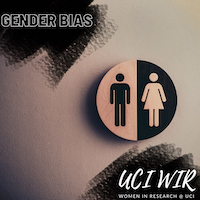 Since its inaugural group in 2021, UCI WIR has engaged 75 mentees across 16 mentorship groups spanning across all academic STEM fields and individual backgrounds [Male 2024]. Based on an internal survey, over half of past participants say that they gained a support network from WIR, while over two-thirds report that participating in the program improved their postdoctoral experience. As the postdoc alumni of the program mature in their careers, some are even beginning to credit WIR as one factor in their success. For example, one former participant stated, "I found this program to be very helpful and believe it contributed to my career path and success in obtaining a position as a tenure-track Assistant Professor." Another participant acknowledged the benefits of connections with other postdoctoral women, commenting, "It is not only a safe space for hard questions, but creates a community of scientists with the same questions [and] concerns looking for advice and support." WIR is currently collecting pre- and post-program quantitative and qualitative metrics from mentees to better track the effectiveness of the WIR program in topics such as career preparedness, knowledge of academia, and peer support networks to further understand the impact of the program and areas for improvement. Though the program is still growing, Dr. Male was awarded the 2023 Dynamic Womxn of the Year Award (Staff) from the UCI Womxn’s Center for Success in recognition of the UCI WIR program and her contributions to improve the experience of postdoctoral women at UCI.
Since its inaugural group in 2021, UCI WIR has engaged 75 mentees across 16 mentorship groups spanning across all academic STEM fields and individual backgrounds [Male 2024]. Based on an internal survey, over half of past participants say that they gained a support network from WIR, while over two-thirds report that participating in the program improved their postdoctoral experience. As the postdoc alumni of the program mature in their careers, some are even beginning to credit WIR as one factor in their success. For example, one former participant stated, "I found this program to be very helpful and believe it contributed to my career path and success in obtaining a position as a tenure-track Assistant Professor." Another participant acknowledged the benefits of connections with other postdoctoral women, commenting, "It is not only a safe space for hard questions, but creates a community of scientists with the same questions [and] concerns looking for advice and support." WIR is currently collecting pre- and post-program quantitative and qualitative metrics from mentees to better track the effectiveness of the WIR program in topics such as career preparedness, knowledge of academia, and peer support networks to further understand the impact of the program and areas for improvement. Though the program is still growing, Dr. Male was awarded the 2023 Dynamic Womxn of the Year Award (Staff) from the UCI Womxn’s Center for Success in recognition of the UCI WIR program and her contributions to improve the experience of postdoctoral women at UCI.
Paving the Path for Inclusive Mentorship
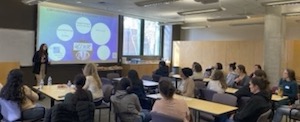 Dr. Male and the UCI WIR leadership team, which includes many alumni mentees of WIR who wanted to give back to the program, as well as other allies who joined the team to support women in science, now aim to expand this program to help women postdoctoral fellows at other institutions launch programs modeled after UCI WIR's success. Historically, the challenges unique to women in STEM have motivated related programs to support gender equity and inclusion, such as initiatives supported by the ADVANCE program of the National Science Foundation (NSF). In the early 2000s, ADVANCE funding sparked the Biomedical Trainee Network (BMTN) at UC-Irvine, which promoted career development for both graduate and postdoctoral women in STEM [Hammond et al. 2006], though this initiative unfortunately did not persist after the funding period ended. There are also other female postdoc-related initiatives in the U.S. [Flint Ehm & Johnson Phillips 2013; Huang 2015] as well as race/ethnic-specific postdoc groups (see MinorityPostdoc Stakeholders page). Critically, WIR may be the first grassroots postdoctoral mentoring program specifically focusing on women that is attempting to replicate itself beyond one campus. Stopping the flood of women leaving academia by placing a WIR-shaped bandage over the postdoc-to-faculty leak will help create gender equity in STEM and provide tangible benefits to the next generation of women scientific leaders.
Dr. Male and the UCI WIR leadership team, which includes many alumni mentees of WIR who wanted to give back to the program, as well as other allies who joined the team to support women in science, now aim to expand this program to help women postdoctoral fellows at other institutions launch programs modeled after UCI WIR's success. Historically, the challenges unique to women in STEM have motivated related programs to support gender equity and inclusion, such as initiatives supported by the ADVANCE program of the National Science Foundation (NSF). In the early 2000s, ADVANCE funding sparked the Biomedical Trainee Network (BMTN) at UC-Irvine, which promoted career development for both graduate and postdoctoral women in STEM [Hammond et al. 2006], though this initiative unfortunately did not persist after the funding period ended. There are also other female postdoc-related initiatives in the U.S. [Flint Ehm & Johnson Phillips 2013; Huang 2015] as well as race/ethnic-specific postdoc groups (see MinorityPostdoc Stakeholders page). Critically, WIR may be the first grassroots postdoctoral mentoring program specifically focusing on women that is attempting to replicate itself beyond one campus. Stopping the flood of women leaving academia by placing a WIR-shaped bandage over the postdoc-to-faculty leak will help create gender equity in STEM and provide tangible benefits to the next generation of women scientific leaders.
Bransch, F. & Kvasnicka, M. (2022) Male gatekeepers: gender bias in the publishing process? Journal of Economic Behavior & Organization, 202:714-732
Flint Ehm, K. & Johnson Phillips, C. (2013) From Ph.D. to Professoriate: Fostering the Advancement of Postdoc Women, National Postdoctoral Association
Guarino, C.M., Borden, V.M.H. (2017) Faculty Service Loads and Gender: Are Women Taking Care of the Academic Family? Research in Higher Education, 58:672–694
Hammond, L., Aguilar-Roca, N.M., Belcher, A., Bohlson, S., Gonzales, R., Ho, S., Hsieh, C., Roca, A.I., and Leslie, F. (2006) The UC-Irvine Biomedical Trainee Network: Extending the NSF ADVANCE Model Toward Pre- and Post-Doctoral Trainees, National Postdoctoral Association poster
Hechtman, L.A., Moore, N.P., Schulkey, C.E., Greenberg, J.H (2018) NIH funding longevity by gender. Proceedings of the National Academies of Science, 115(31):7943-7948
Huang, B.L. (2015) Advancing Postdoc Women Guidebook, National Postdoctoral Association
Lerchenmueller, M.J., Sorenson, O. (2018) The gender gap in early career transition in the life sciences. Research Policy, 47:1007-1017
Lee, J., Williams, J. C., & Li, S. (2017) Parents in the pipeline: Retaining postdoctoral researchers with families, Worklife Law
Male, A. (2024) UCI WIR: Impact on a Demographically Diverse Group of Postdoctoral Women, National Postdoctoral Association poster
McCullough, L. (2019) Proportions of women in STEM leadership in the academy in the USA. Education Sciences, 10:1
Morgan, A.C., Way, S.F., Hoeffer, M.J.D., Larremore, D.B., Galesic, M., Clauset, A. (2021) The unequal impact of parenthood in academia. Science Advances, 7(9)
Pell, A.N. (1996) Fixing the leaky pipeline: women scientists in academia. Journal of Animal Science, 74(11):2843-2848
National Center for Science and Engineering Statistics (2023) Doctorate Recipients from U.S. Universities: 2022, NSF 24-300, National Science Foundation, Alexandria, VA
National Science Board (2021) The STEM Labor Force of Today: Scientists, Engineers and Skilled Technical Workers. Science and Engineering Indicators 2022, NSB-2021-2, National Science Foundation, Alexandria, VA
Roper, R.L. (2019) Does gender bias still affect women in science? Microbiology and Molecular Biology Reviews, 83(3):10-1128
Ross, M.B., Glennon, B.M., Murciano-Goroff, R., Berkes, E.G., Weinberg, B.A., & Lane, J.I. (2022) Women are credited less in science than men. Nature, 608(7921):135-145
Teich, E.G., Kim, J.Z., Lynn, C.W., Simon, S.C., Klishin, A.A., Szymula, K.P., Srivastava, P., Bassett, L.C., Zurn, P., Dworkin, J.D. & Bassett D.S. (2022) Citation inequity and gendered citation practices in contemporary physics. Nature Physics, 18:1161–1170
Wu, J., Cropps, T., Phillips, C. M. L., Boyle, S., & Pearson, Y. E. (2023) Applicant qualifications and characteristics in STEM faculty hiring: an analysis of faculty and administrator perspectives. International Journal of STEM Education, 10(1):41
(First) UCI WIR Logo. (Credit: UCI WIR)
(Second) The 2023 UCI WIR Organizing Board (from left to right): Alie Male, PhD; Jenna Adams, PhD; Maren Pein, PhD; Belén Torrado, PhD; Asha Densi, PhD. (Credit: UCI WIR)
(Third) Flyer from WIR event on the topic of gender bias. (Credit: UCI WIR modification of Alamy stock photo)
(Fourth) The May 2023 WIR Social Mixer provided information about the program, tips & games on succeeding as a women in academia, and an informal space for postdoctoral women and faculty to network (Credit: UCI WIR)
J.N. Adams, D. Meegan-Kumar, A. Male (2024) Empowering Postdoctoral Women Through Mentorship: A Spotlight on the UC Irvine Women in Research Community. DiverseScholar 15:2
Jenna N. Adams, Ph.D. is a Postdoctoral Fellow in the Department of Neurobiology and Behavior at UCI and serves on the Organizing Committee for UCI WIR after having completed the program as a postdoctoral mentee. Dervla Meegan-Kumar, Ph.D is a Postdoctoral Scholar in the Department of Earth System Science at UCI and serves on the Organizing Committee for UCI WIR after having completed the program as a postdoctoral mentee. Alie Male, Ph.D. founded UCI WIR during her time as a Postdoctoral Scholar in the School of Medicine to address an unmet need in early career women in research settings, and currently serves as President of the program. Any opinions expressed in this article are solely those of the authors.
UCI WIR would like to thank the UC-Irvine Graduate Division, Office of Postdoctoral Affairs, and Postdoctoral Association for its support in advertising and recruitment efforts. Further, WIR would like to thank GPS-STEM for providing funding to support WIR community events. UCI WIR would like to acknowledge and thank Alberto I. Roca, PhD for editorial comments and helpful discussions about the article.
DiverseScholar is now publishing original written works. Submit article ideas by contacting us at info@DiverseScholar.org.
Originally published 29-Dec-2024
